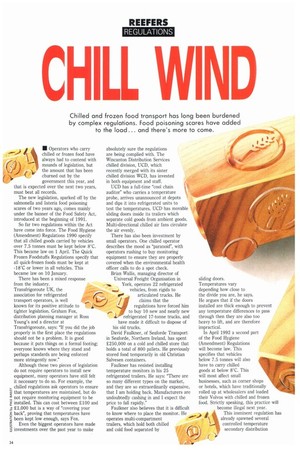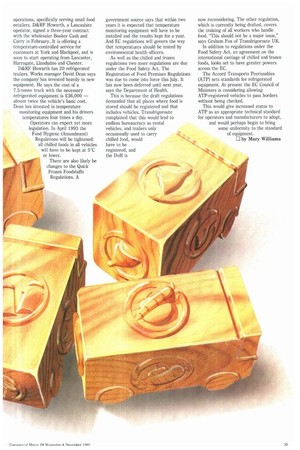CHILL WIND
Page 36

Page 37

If you've noticed an error in this article please click here to report it so we can fix it.
Chilled and frozen food transport has long been burdened by complex regulations. Food poisoning scares have added to the load.., and there's more to come.
in Operators who carry chilled or frozen food have always had to contend with mounds of legislation, but
, the amount that has been
churned out by the government this year, and that is expected over the next two years, must beat all records.
The new legislation, sparked off by the salmonella and listeria food poisoning scares of two years ago, comes mainly under the banner of the Food Safety Act, introduced at the beginning of 1991.
So far two regulations within the Act have come into force. The Food Hygiene (Amendment) Regulations 1990 specify that all chilled goods carried by vehicles over 7.5 tonnes must be kept below 8°C. This became law on 1 April. The Quick Frozen Foodstuffs Regulations specify that all quick-frozen foods must be kept at -18°C or lower in all vehicles. This became law on 10 January.
There has been a mixed response from the industry. Transfrigoroute UK, the association for refrigerated transport operators, is well known for its positive attitude to tighter legislation. Graham Fox, distribution planning manager at Ross Young's and a director at Transfrigoroute, says: "If you did the job properly in the first place the regulations should not be a problem. It is good because it puts things on a formal footing; everyone knows where they stand and perhaps standards are being enforced more stringently now."
Although these two pieces of legislation do not require operators to install new equipment, many operators have still felt it necessary to do so. For example, the chilled regulations ask operators to ensure ti that temperatures are maintained, but do not require monitoring equipment to be installed. This can cost between £100 and £1,000 but is a way of "covering your 6 back", proving that temperatures have F, been kept low enough, says Fox.
t7, Even the biggest operators have made 2 investments over the past year to make absolutely sure the regulations are being complied with. The Wincanton Distribution Services chilled division, UCD, which recently merged with its sister chilled division WCD, has invested in both equipment and staff.
LICD has a full-time "cool chain auditor" who carries a temperature probe, arrives unannounced at depots and dips it into refrigerated units to test the temperatures. UCD has movable sliding doors inside its trailers which separate cold goods from ambient goods. Multi-directional chilled air fans circulate the air evenly.
There has also been investment by small operators. One chilled operator describes the mood as "paranoid", with operators rushing to buy monitoring equipment to ensure they are properly covered when the environmental health officer calls to do a spot check.
Brian Wallis, managing director of Universal Freight Organisation in
Nth York, operates 22 refrigerated IMMO vehicles, from rigids to
articulated trucks. He claims that the regulations have forced him to buy 10 new and nearly new refrigerated 17-tonne trucks, and have made it difficult to dispose of his old trucks.
David Faulkner, of Seaforde Transport in Seaforde, Northern Ireland, has spent £250,000 on a cold and chilled store that holds a total of 800 pallets. He previously stored food temporarily in old Christian Salvesen containers.
Faulkner has resisted installing temperature monitors in his 25 refrigerated trailers. He says: "There are so many different types on the market, and they are so extraordinarily expensive, that I am holding back. Manufacturers are undoubtedly cashing in and I expect the price to fall rapidly."
Faulkner also believes that it is difficult to know where to place the monitor. He operates multi-compartment trailers, which hold both chilled and cold food separated by sliding doors.
Temperatures vary depending how close to the divide you are, he says. He argues that if the doors installed are thick enough to prevent any temperature differences to pass through then they are also too heavy to lift, and are therefore impractical.
In April 1992 a second part of the Food Hygiene (Amendment) Regulations will become law. This specifies that vehicles below 7.5 tonnes will also have to carry chilled goods at below 8°C. This will most affect small businesses, such as corner shops or hotels, which have traditionally rolled up at wholesalers and loaded their Volvos with chilled and frozen food. Strictly speaking, this practice will become illegal next year This imminent regulation has already spawned several controlled temperature secondary distribution operations, specifically serving small food retailers. D&RF Howarth, a Lancashire operator, signed a three-year contract with the wholesaler Booker Cash and Carry in February. It is offering a temperature-controlled service for customers at York and Blackpool, and is soon to start operating from Lancaster, Harrogate, Llandudno and Chester.
D&RF Howarth has 20 refrigerated trailers. Works manager David Dean says the company has invested heavily in new equipment. He says the cost of a 7.5-tonne truck with the necessary refrigerated equipment is 06,000 — almost twice the vehicle's basic cost. Dean has invested in temperature monitoring equipment and his drivers temperatures four times a day.
Operators can expect yet more legislation. In April 1993 the Food Hygiene (Amendment) Regulations will be tightened: all chilled foods in all vehicles will have to be kept at 5°C or lower.
There are also likely be changes to the Quick Frozen Foodstuffs Regulations. A government source says that within two years it is expected that temperature monitoring equipment will have to be installed and the results kept for a year. And EC regulations will govern the way that temperatures should be tested by environmental health officers.
As well as the chilled and frozen regulations two more regulations are due under the Food Safety Act. The Registration of Food Premises Regulations was due to come into force this July. It has now been deferred until next year, says the Department of Health.
This is because the draft regulations demanded that all places where food is stored should be registered and that includes vehicles. Transfrigoroute complained that this would lead to endless bureaucracy as rental vehicles, and trailers only occasionally used to carry chilled food, would have to be registered, and the DoH is now reconsidering. The other regulation, which is currently being drafted, covers the training of all workers who handle food. "This should not be a major issue," says Graham Fox of Transfrigoroute UK.
In addition to regulations under the Food Safety Act, an agreement on the international carriage of chilled and frozen foods, looks set to have greater powers across the EC.
The Accord Transports Peerissables (ATP) sets standards for refrigerated equipment. At present the EC Council of Ministers is considering allowing ATP-registered vehicles to pass borders without being checked.
This would give increased status to ATP as an appropriate technical standard for operators and manufacturers to adopt, and would perhaps begin to bring some uniformity to the standard of equipment.
by Mary Williams


























































































